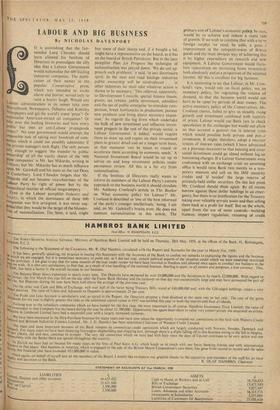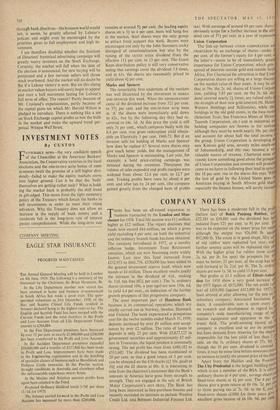LABOUR AND BIG BUSINESS
By NICHOLAS DAVENPORT IT is astonishing that the fair- minded Lord Chandos should have allowed his Institute of Directors to promulgate the silly idea that a Labour Government would nationalise the 600 leading industrial companies. The publi- cation of their names in the popular Conservative press. which was intended to excite alarm and horror, served only to
raise a hearty laugh. Would any Labour administration in its senses take over Heaverbrook Newspapers, Odhams and Kenisley Newspapers and get the world's worst 'press"? Or nationalise American-owned oil companies? Or lake over the leading breweries and turn every Public bar into an anti-Labour propaganda yentre? No sane government would attempt the impossible task of taking over hundreds of corn- Panics which it could not possibly administer if the private managers took flight. The only person %WY enough to suggest 'the transfer to public ownership' of all the equity shares of the '600 giant companies' is Mr. Ian Mikardo. writing in iribune, but Mr. Mikardo has as much influence Upon Mr. Gaitskell and his team as the red Dean of Canterbury. Lord Chandos forgets that Mr. Mikardo did not become vice-chairman of the labour Party by right of power but by the hierarchical routine of official mugwumpery. Even in the Labour pamphlet Industry and society, in which the dominance of these 600 eollipanies was first arraigned, it was never sug- gested that they would be the target of the blunder- buss of nationalisation. The State, it said, might buy some of their shares and, if it bought a lot, might have a representative on the board, as it has on the board of British Petroleum. But in the later pamphlet Plan for Progress the technique of nationalisation was played down. 'We do not ap- proach such problems,' it said, in any doctrinaire spirit. In the steel and road haulage industries public ownership will be reintroduced . . . in other industries we shall take whatever action is shown to be necessary.' This referred, apparently, to Development Councils, special finance (loans, grants, tax rebates, public investment, subsidies) and the use of public enterprise 'to stimulate com- petition, break bottlenecks in production, pioneer new products and bring about necessary expan- sion.' As regards the big firms which undertake the bulk of new investment and influence invest- ment projects in the rest of the private sector, a Labour Government, it added, would require them to draw up and report on their investment plans in greater detail and on a longer-term basis, so that measures 'can be taken to retard or accelerate them according to economic needs.' A National Investment Board would be set up to advise on and keep investment policies under permanent review. All this is a far cry from nationalisation.
If the Institute of Directors really wants to inform its members of the Labour Party's current approach to the business world' it should circulate Mr. Anthony Crosland's article in The Banker on 'What economic policy for Labour'?' Mr. Crosland is described as 'one of the best informed of the party's younger intellectuals,' being, I am told, on Mr. Gaitskell's brains trust. He does not mention nationalisation in this article. The primary aim of Labour's economic' policy. he says, would be to achieve and sustain a rapid rate of growth. if we wish to combine that with a larc,e foreign surplus we need, he adds, a gene] I improvement in the competitiveness of Britisn goods and the most obvious way of achieving this is by higher expenditure on research and new equipment. A Labour Government would there- fore concentrate on increasing home investment both absolutely and as a proportion of the national income. All this is excellent for big business, It is interesting to see that Labour, in Mr. Cros- 'land's view, would rely on fiscal policy, not on monetary policy, for regulating the volume of- demand, so that the business world would not have to be upset by periods of dear money. The active monetary policy of the.Conservatives, Mr. Crosland claims, failed to give us steadily rising growth and investment combined with stability of prices. Labour would use Bank rate to check speculation in the exchanges but would not allow on that account a general rise in interest rates- which would penalise both private and puo..c investment. It might, therefore, adopt a two-tier- system of interest rates (which I have advocated on a previous occasion) so that housing and other social investment could go ahead without hig:ter borrowing charges. If a Labour Government were confronted with an exchange crisis on assuming- office it would raise Bank rate merely as a tem- porary measure and call on the IMF stand-by credits and 'if needed' the large reserve of privately-held dollar securities. On this last point. Mr. Crosland should think again. By all means borrow against these dollar holdings in an emer- gency, but there is no justification for the Treasury taking over valuable private assets and then selling them back at a profit for itself. But on the whole, apart from the use of some controls—building licences, import regulation, rationing of credit
through bank directives-the business world would not, it seems, be greatly affected by Labour's policies and might even be encouraged by the priorities given to full employment and high in- vestment.
I am therefore doubtful whether the Institute of Directors' hysterical advertising campaign will greatly worry investors on the Stock Exchange. Certainly, the market will fall when the date of the election is announced, for new buying will be postponed and a few nervous sellers will throw stock overboard. And the market will no doubt be flat if a Labour victory is won. But on this slum in market values buyers will surely begin to appear and start a bull movement lasting for Labour's full term of office. The reason? Partly because of Mr. Crosland's expansionism, partly because of the capital gains tax which Mr. Harold Wilson is pledged to introduce. There is nothing like a tax on Stock Exchange capital profits to box the bulls in the market and make the upward trend per- petual. Witness Wall Street.



































 Previous page
Previous page